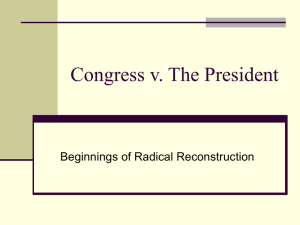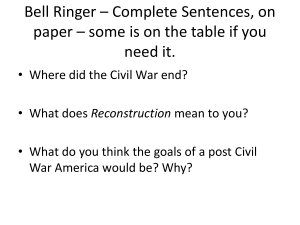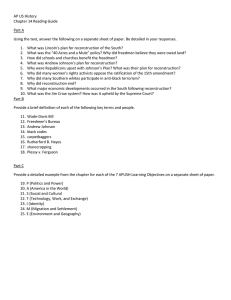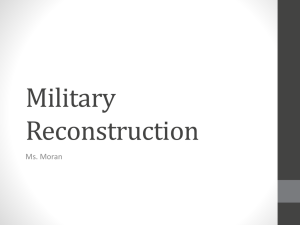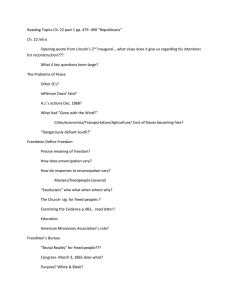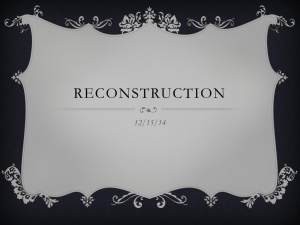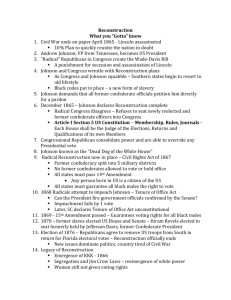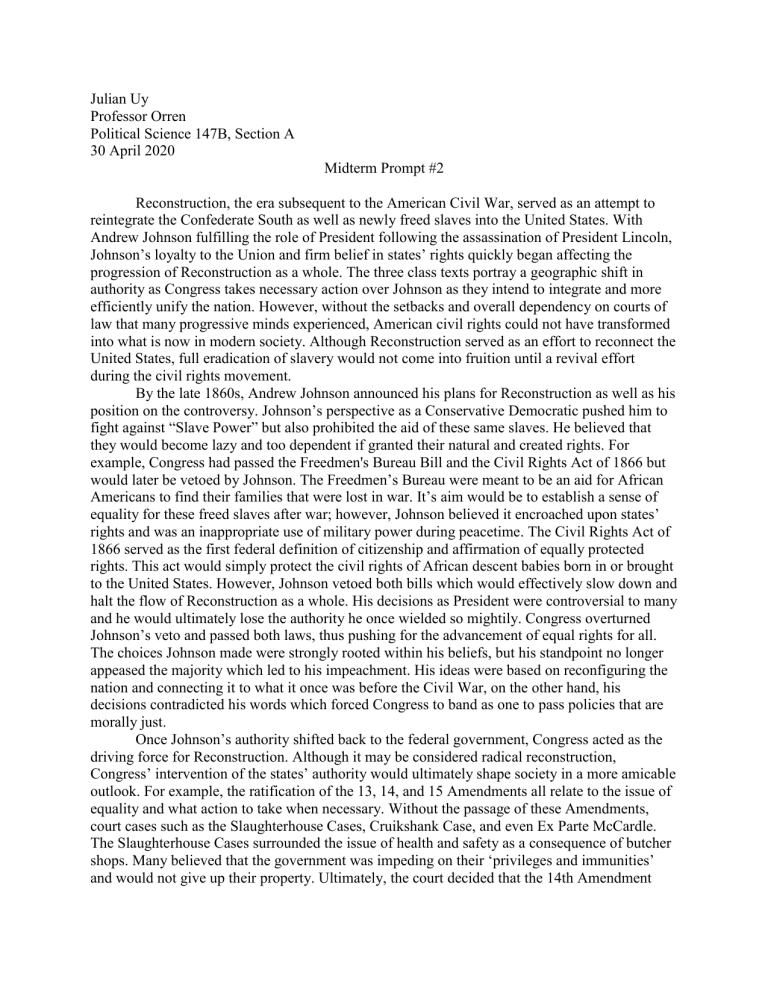
Julian Uy Professor Orren Political Science 147B, Section A 30 April 2020 Midterm Prompt #2 Reconstruction, the era subsequent to the American Civil War, served as an attempt to reintegrate the Confederate South as well as newly freed slaves into the United States. With Andrew Johnson fulfilling the role of President following the assassination of President Lincoln, Johnson’s loyalty to the Union and firm belief in states’ rights quickly began affecting the progression of Reconstruction as a whole. The three class texts portray a geographic shift in authority as Congress takes necessary action over Johnson as they intend to integrate and more efficiently unify the nation. However, without the setbacks and overall dependency on courts of law that many progressive minds experienced, American civil rights could not have transformed into what is now in modern society. Although Reconstruction served as an effort to reconnect the United States, full eradication of slavery would not come into fruition until a revival effort during the civil rights movement. By the late 1860s, Andrew Johnson announced his plans for Reconstruction as well as his position on the controversy. Johnson’s perspective as a Conservative Democratic pushed him to fight against “Slave Power” but also prohibited the aid of these same slaves. He believed that they would become lazy and too dependent if granted their natural and created rights. For example, Congress had passed the Freedmen's Bureau Bill and the Civil Rights Act of 1866 but would later be vetoed by Johnson. The Freedmen’s Bureau were meant to be an aid for African Americans to find their families that were lost in war. It’s aim would be to establish a sense of equality for these freed slaves after war; however, Johnson believed it encroached upon states’ rights and was an inappropriate use of military power during peacetime. The Civil Rights Act of 1866 served as the first federal definition of citizenship and affirmation of equally protected rights. This act would simply protect the civil rights of African descent babies born in or brought to the United States. However, Johnson vetoed both bills which would effectively slow down and halt the flow of Reconstruction as a whole. His decisions as President were controversial to many and he would ultimately lose the authority he once wielded so mightily. Congress overturned Johnson’s veto and passed both laws, thus pushing for the advancement of equal rights for all. The choices Johnson made were strongly rooted within his beliefs, but his standpoint no longer appeased the majority which led to his impeachment. His ideas were based on reconfiguring the nation and connecting it to what it once was before the Civil War, on the other hand, his decisions contradicted his words which forced Congress to band as one to pass policies that are morally just. Once Johnson’s authority shifted back to the federal government, Congress acted as the driving force for Reconstruction. Although it may be considered radical reconstruction, Congress’ intervention of the states’ authority would ultimately shape society in a more amicable outlook. For example, the ratification of the 13, 14, and 15 Amendments all relate to the issue of equality and what action to take when necessary. Without the passage of these Amendments, court cases such as the Slaughterhouse Cases, Cruikshank Case, and even Ex Parte McCardle. The Slaughterhouse Cases surrounded the issue of health and safety as a consequence of butcher shops. Many believed that the government was impeding on their ‘privileges and immunities’ and would not give up their property. Ultimately, the court decided that the 14th Amendment would only apply to national level rights, not state. Furthermore, the Cruikshank Case revolved around the issue of the Colfax Massacre which ruled to be a crime not motivated by race since there were also white men killed. Lastly, Ex Parte McCardle would solidify the legitimacy of the writ of habeas corpus. Without this case, groups such as the KKK would have been of more malice and could have escalated farther than already had. Despite the efforts of the Civil War, Reconstruction was heavily dependent on its officers and courts of law. Without such cases and individuals to push their platform, society would not be the way we see it today.

